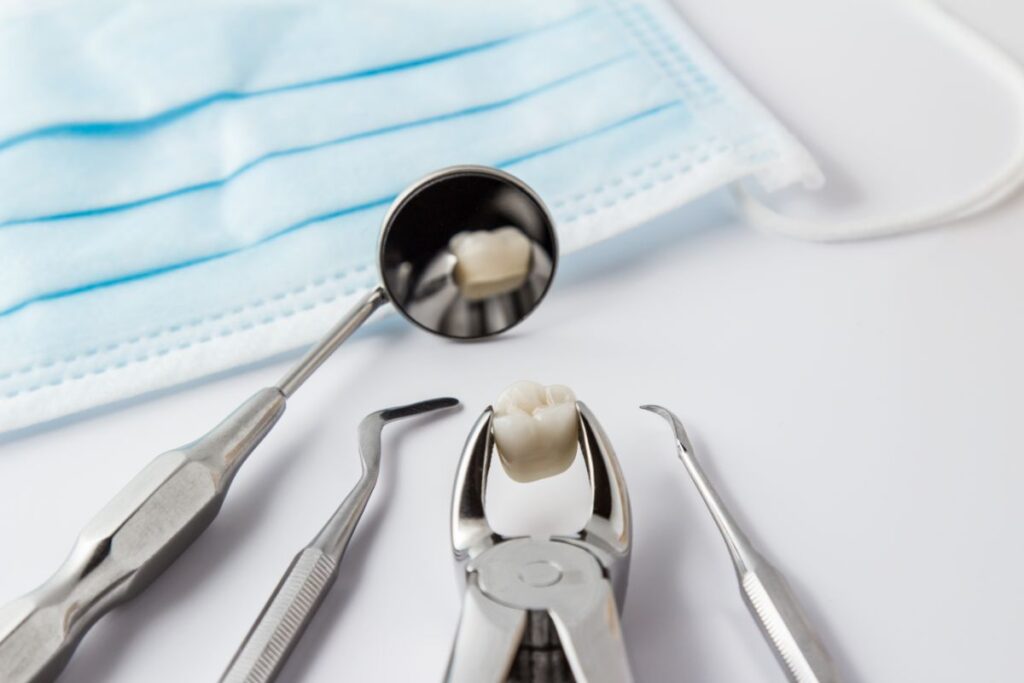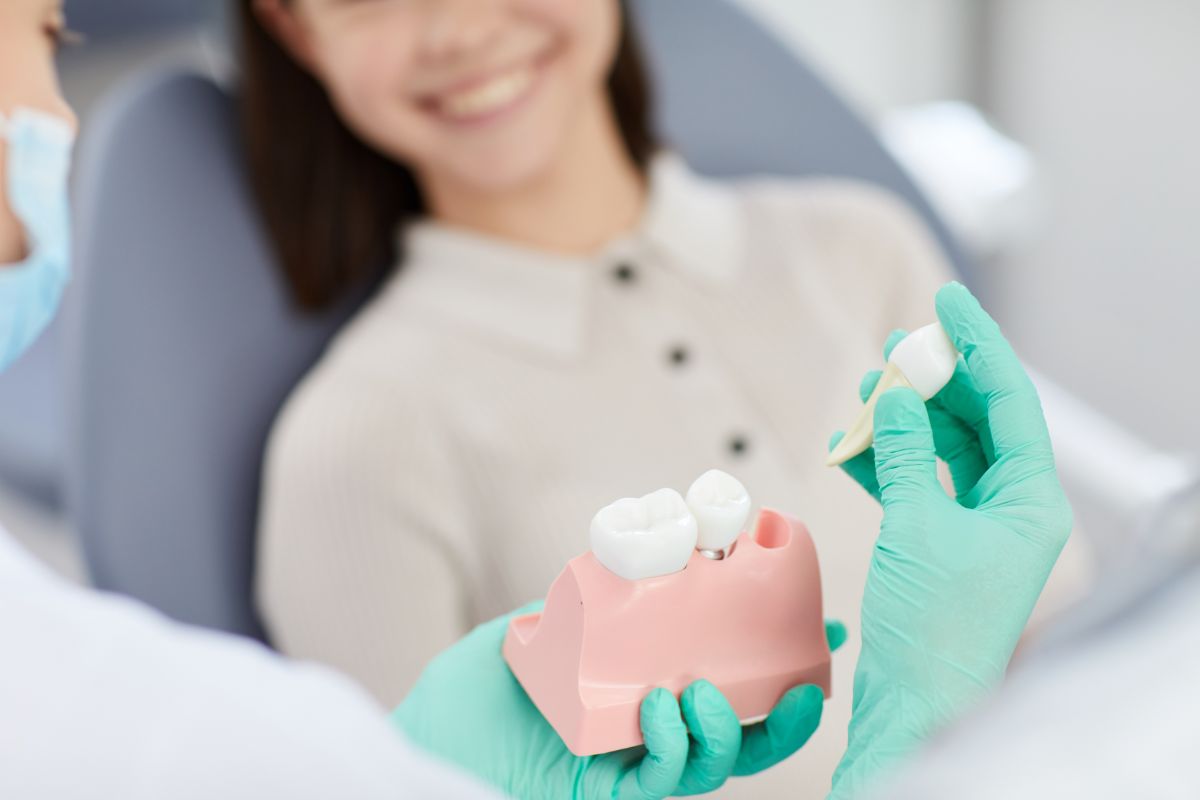As the region’s only accredited oral surgery center, the Northeast Arkansas Center for Oral and Maxillofacial Surgery team sees many patients who need multiple teeth removed. While it may be a standard procedure in our Jonesboro office, having several teeth extracted at once is different from removing one or two. Whatever the reason for this surgery, it’s important that patients know what to expect before, during, and after the procedure. If this is something you may be facing soon, keep reading below to learn more!
When is multiple tooth extraction considered necessary?
Dr. McDonough and Dr. Phillips prefer to take a conservative approach to extractions by trying to save compromised teeth as often as possible with fillings, dental crowns, or root canals. However, there are times when extraction may be the best choice for your oral health. This can be true in cases of severe decay or damage, extreme overcrowding, or wisdom teeth.
Since the latter are the last molars to erupt, they’re more likely than other teeth to become impacted or infected. Whether it’s the wisdom teeth or others causing problems for a patient, extraction is generally the last resort. When it is necessary, our expert team is committed to making the experience as stress-free and pain-free as possible.
The number of teeth that will need to be extracted depends on each unique case. Before any removal procedure, Dr. McDonough and Dr. Phillips will carefully consider several factors, including your overall health, the teeth needing to be removed, and more. This will help them develop a customized treatment plan for your specific needs and goals.
Preparing for your tooth extraction procedure
First and foremost, don’t stress out! We know that having a single tooth extracted can be overwhelming, let alone multiple teeth, but you’re in good hands. It’s easier to stay calm if you’re prepared for this appointment ahead of time. Ask Dr. McDonough or Dr. Phillips about anything you don’t understand so they can ensure you feel confident in our care and have your medical history on hand. Some conditions can make you more susceptible to infection, such as an impaired immune system, so we’ll need to know about them.
Since you’ll likely be given anesthesia or sedation when undergoing your tooth extraction, you’ll also be asked to present us with a complete list of your current medications so we can avoid any potential drug interactions and ensure your procedure is performed as safely as possible.
If you’ve had anesthesia before and experienced side effects, be sure to let us know before your appointment. This will help our team prepare a medication plan that will ensure you are comfortable and not at risk for any unpleasant reactions.

Additional pre-surgery guidance
In most instances, you should avoid eating anything for 8 hours prior to your tooth extraction procedure as this will help prevent any untoward events during surgery. If we’ll be using a local anesthetic, you will not have to avoid food prior to surgery. If you have a condition that doesn’t allow you to fast safely, such as diabetes, be sure to let us know at the consult appointment.
Ideally, you should stop smoking completely before your dental procedure. Smoking slows down the healing process and increases your risk of developing a dry socket, a painful condition that causes intense pain. If you’re unable to give up smoking entirely, you must avoid it for 12 hours prior to surgery and 48 hours after it is complete.
Dress comfortably for your appointment and avoid jewelry, contact lenses, and heavy perfume or lotions. Your lips will likely be dry once we complete the procedure, so you may want to bring some chapstick with you to moisturize them. You’ll need someone to drive you home, too! You’d be surprised how many patients expect to just hop in their car and drive themselves home after having anesthesia. Arrange for a friend or family member to come to the appointment with you, take you home once your surgery is complete and stay with you for at least a few hours after surgery.
If you’re able to take some time off work, consider arranging for childcare and taking a day off work so you’ll have time to rest immediately following your surgery. If you live alone, you may want to ask someone to stay overnight with you the first night. We also recommend having some soft foods prepared ahead of time to avoid having to worry about cooking the first couple of days.
How to care for your mouth at home following a tooth extraction
As noted above, soft foods are recommended for at least 24 hours post-surgery. Yogurt and smoothies are popular choices. Avoid drinking through a straw if you opt for a smoothie or milkshake! Don’t rinse your mouth out at first or force spit out, either. All of these can lead to a dry socket.
You’ll need to take it easy a couple of days after your extraction. Some swelling is normal, but notify our office immediately if you notice any of the following symptoms:
- shortness of breath or chest pain
- severe bleeding or swelling
- fever or chills
- nausea or vomiting
A small amount of bleeding is also to be expected following a tooth extraction. If this occurs, place a gauze pad directly over the bleeding socket and apply biting pressure for 30 minutes. Avoid hot liquids, exercise, and elevate your head during any bleeding episodes. If it persists, let us know promptly.
For the first 24 hours, ice packs can be used externally on the cheek near the surgical site. Mild discomfort can be treated with over-the-counter pain relievers. If you’ve been prescribed painkillers, take them exactly as directed by Dr. McDonough or Dr. Phillips. Any antibiotics that have been prescribed need to be completed in their entirety.
Drink plenty of fluids, but do not rinse your mouth for 24 hours or while any bleeding is present. After the first day, you can use a warm salt water rinse every 4 hours and after meals to flush out food debris and other particles that may become lodged in the extraction area. This will also help soothe any lingering soreness.
Trust your tooth extraction to the experts at Northeast Arkansas Center for Oral and Maxillofacial Surgery
When you know what to expect from having multiple teeth removed, it doesn’t seem quite so frightening. Our experienced team goes above and beyond to make the extraction process as comfortable and pain-free as possible. We use the latest technology to help reduce postoperative discomfort and cause less harm to the tissue and surrounding bone. If you have more than one tooth that needs to be removed for your oral health, get in touch today to schedule a consultation with Dr. McDonough and Dr. Phillips! We’ll be happy to walk you through your options for a healthy and pain-free smile.
